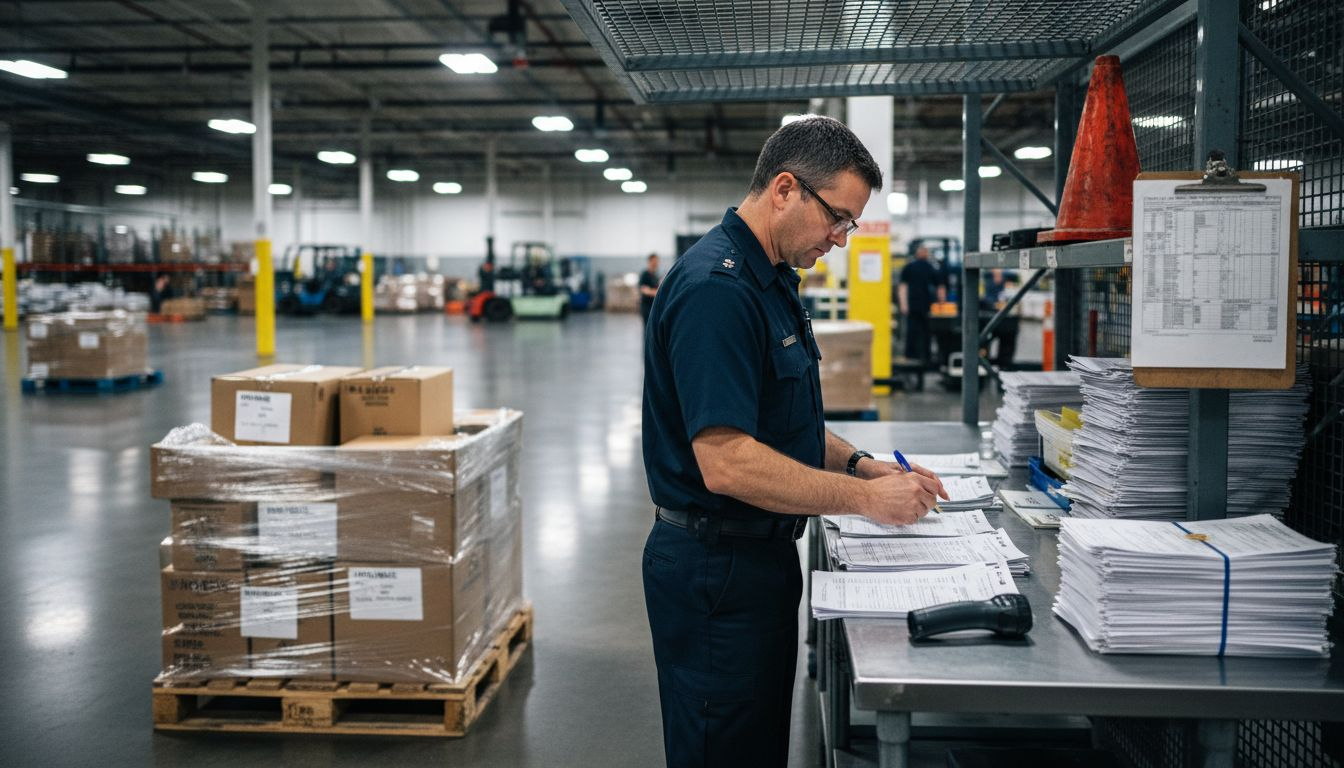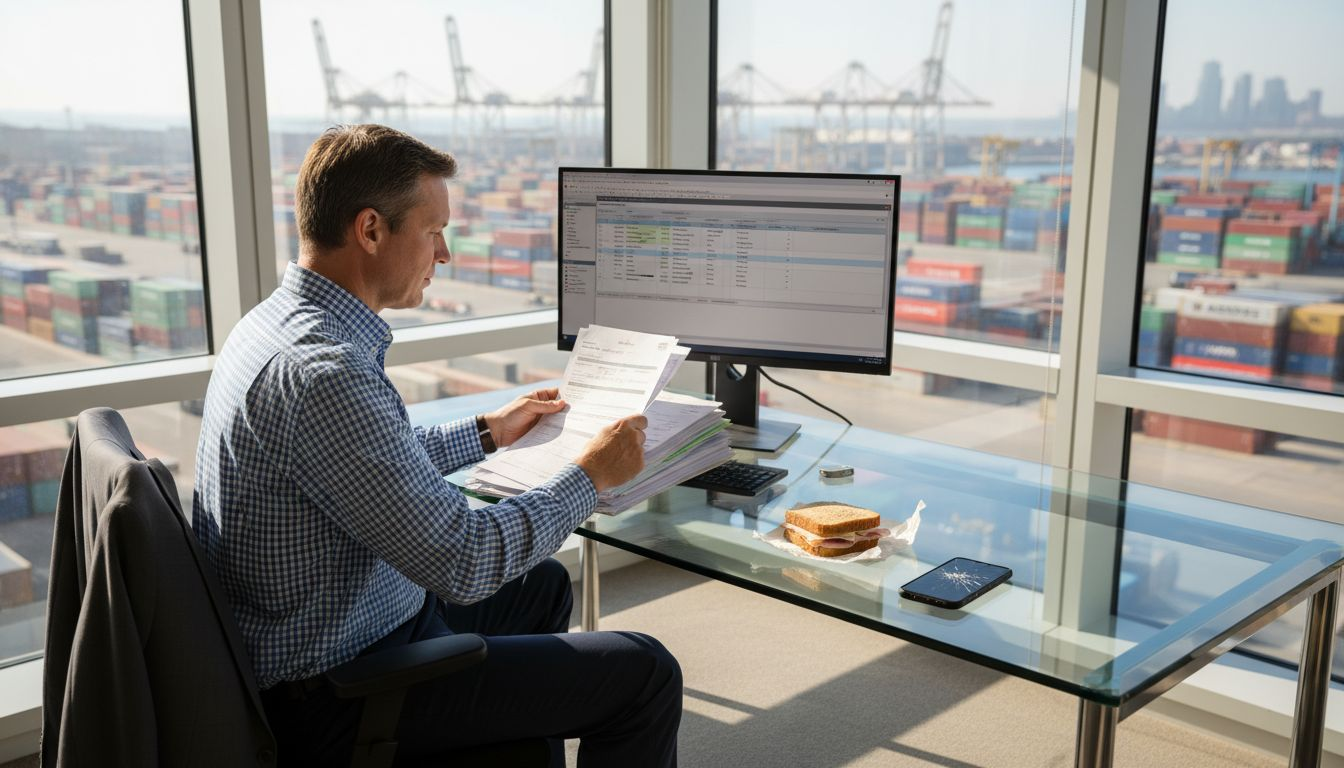Did you know that global air freight moves over 52 million metric tons of cargo each year? Shipping goods across borders by air can feel overwhelming because each quote reflects layers of logistics, compliance, and risk. Choosing the right service, knowing how costs are calculated, and understanding your shipment’s requirements can mean the difference between smooth delivery and costly delays. Reliable information gives you the tools to make confident choices for efficient international shipping.
Table of Contents
- Understand The Basics Of International Air Freight Quotes
- Identify The Required Shipment Details For Accurate Pricing
- Compare Service Levels And Transit Times Offered
- Assess The Impact Of Customs And Compliance Requirements
- Factor In Cargo Insurance And Risk Management
- Leverage Technology For Instant And Reliable Quotes
- Evaluate Additional Services That Affect Quote Accuracy
Quick Summary
| Takeaway | Explanation |
|---|---|
| 1. Provide detailed shipment information | Accurate shipping quotes depend on precise details like weight, dimensions, and type of goods. |
| 2. Understand variability in quotes | International freight quotes can change due to fuel prices and market conditions, so stay informed. |
| 3. Evaluate service levels beyond price | Compare transit times and reliability of services, not just costs, for optimal shipping strategies. |
| 4. Comply with customs regulations | Meeting customs requirements is critical to avoid delays and penalties during international shipping. |
| 5. Invest in cargo insurance | Comprehensive insurance protects against potential losses or damages during transport, safeguarding your investment. |
1. Understand the Basics of International Air Freight Quotes
Securing an accurate international air freight quote starts with a solid understanding of the fundamental principles governing global shipping logistics. These quotes are more than just price tags they represent complex calculations involving multiple variables that determine your shipment’s successful transportation.
At its core, an international air freight quote reflects the comprehensive costs associated with moving your goods across borders. According to IATA’s guidelines on air cargo rules, these quotes encompass critical factors like weight, volume, distance, cargo type, and carrier regulations.
To navigate this process effectively, you need to grasp several key elements. Shipping regulations vary dramatically between countries and carriers. The International Air Transport Association (IATA) establishes standard “ready for carriage” guidelines that dictate how different types of cargo can be transported. These rules ensure safety, compliance, and smooth international transit.
When requesting a quote, be prepared to provide detailed information about your shipment:
- Exact weight and dimensions of your cargo
- Origin and destination countries
- Type of goods being shipped
- Packaging specifications
- Any special handling requirements
Professional freight forwarders use these details to calculate precise shipping costs. The more accurate and comprehensive your initial information, the more precise your quote will be. Think of it like assembling a complex puzzle where each piece of information helps create a complete picture of your shipping requirements.
Remember that international air freight quotes are not static they can fluctuate based on fuel prices, seasonal demand, and global economic conditions. Staying informed and working with experienced logistics professionals can help you secure the most competitive and accurate quote for your specific shipping needs.
2. Identify the Required Shipment Details for Accurate Pricing
Accurate pricing in international air freight begins with providing comprehensive shipment details. Your ability to secure a precise quote depends entirely on the quality and completeness of the information you share with freight providers.
According to freight quote factors every shipper should know, several critical details will determine your shipping costs. Precise measurement and documentation are not just recommended they are essential for obtaining an accurate quote.
The primary shipment details you must collect include:
- Exact weight of your cargo
- Total volume and dimensional measurements
- Specific packaging type
- Commodity description
- Origin and destination locations
- Special handling requirements
- Declared value of goods
Carriers calculate shipping costs using complex formulas that consider both actual weight and volumetric weight. This means your shipment will be charged based on whichever measurement is higher. International Air Transport Association (IATA) guidelines recommend precise documentation to ensure fair and accurate pricing.
Professional shippers understand that even minor inaccuracies can lead to significant pricing discrepancies. Invest time in measuring your cargo meticulously. Use professional weighing equipment and include all packaging materials in your calculations. A digital scale and measuring tape can be your best tools in gathering these critical details.
Remember that transparency builds trust with freight providers. The more detailed and accurate your shipment information, the more likely you are to receive a quote that reflects your true shipping costs without unexpected surprises.
3. Compare Service Levels and Transit Times Offered
Not all air freight services are created equal. Understanding the nuanced differences in service levels and transit times can dramatically impact your shipping strategy and overall logistics efficiency.
When comparing international shipping providers, you need to look beyond just the price tag. Understanding shipping options requires a comprehensive evaluation of multiple service characteristics that directly influence your shipment’s reliability and speed.
Key service level factors to compare include:
- Standard freight services
- Express shipping options
- Expedited transportation
- Door to door delivery
- Specialized handling capabilities
Transit times vary significantly between carriers. Some providers might offer faster routes with more frequent flights, while others could provide more economical but slower transportation. The US Department of Commerce recommends conducting thorough research to understand each carrier’s specific strengths and limitations.
Professional shippers recognize that the cheapest option is not always the best. Consider factors like reliability, tracking capabilities, and insurance coverage alongside transit duration. A slightly more expensive service with guaranteed delivery and comprehensive tracking might save you significant stress and potential financial losses.
To make an informed decision, request detailed service breakdowns from multiple carriers. Ask specific questions about their average transit times, frequency of flights to your destination, and any potential seasonal variations that might impact shipping speed. Look for providers who offer transparent information and can provide real time updates on your shipment’s progress.
Remember that your choice of service level should align with your specific business needs. Whether you require lightning fast delivery or are working with a more flexible timeline, there is a service level designed to meet your unique shipping requirements.
4. Assess the Impact of Customs and Compliance Requirements
Navigation through international shipping regulations is like traversing a complex legal maze. Understanding customs and compliance requirements is not just recommended it is absolutely critical for successful global freight operations.
According to international trade compliance basics, every shipment must meet strict regulatory standards that vary dramatically between countries. Failing to comply can result in significant financial penalties, shipment delays, or even cargo seizure.
Critical compliance considerations include:
- Export documentation accuracy
- Restricted and prohibited item regulations
- Tariff and duty classifications
- Country specific import restrictions
- Proper commodity descriptions
Shipping international cargo requires meticulous attention to detail. For shipments valued over $2,500, you must file Electronic Export Information with U.S. government agencies. This requirement ensures transparency and helps prevent potential export control violations.
Professional shippers understand that compliance is not a one size fits all process. Each destination country presents unique challenges. Some may require specific packaging, detailed commodity descriptions, or additional certifications. Research and preparation are your best strategies for smooth international shipping.
To mitigate risks, consider working with experienced customs brokers who understand the intricate landscape of international trade regulations. They can help you navigate complex paperwork, interpret ever changing global trade rules, and ensure your shipments meet all necessary legal requirements.
Remember: investing time in understanding compliance requirements upfront can save you significant money, stress, and potential legal complications down the line.
5. Factor in Cargo Insurance and Risk Management
Shipping valuable goods internationally involves inherent risks that can quickly transform a routine transaction into a financial nightmare. Understanding cargo insurance and implementing robust risk management strategies is not optional it is essential for protecting your business investment.
Freight insurance basics reveal that different shipment types require specialized coverage. Air freight offers unique advantages such as reduced transit times and lower risk of theft compared to other transportation methods.
Key risk management considerations include:
- Total cargo value assessment
- Potential transportation hazards
- Geographic shipping routes
- Packaging quality and durability
- Carrier liability limitations
Professional shippers recognize that standard carrier liability provides minimal protection. Most carriers reimburse only a fraction of your cargo’s actual value, leaving significant financial exposure. Comprehensive cargo insurance bridges this critical gap, offering protection against loss, damage, and unexpected complications during international transit.
To effectively manage risk, thoroughly evaluate your cargo’s characteristics. High value or fragile items require more comprehensive insurance coverage. Consider factors like potential environmental challenges, route complexity, and specific handling requirements when selecting your insurance policy.
Careful packaging plays a crucial role in risk mitigation. Invest in sturdy, appropriate packaging materials that protect your goods from potential damage. Proper labeling and documentation can also significantly reduce the likelihood of shipping complications.
Remember that proactive risk management is always more cost effective than reactive problem solving. A small upfront investment in comprehensive cargo insurance can save your business from potentially devastating financial losses.
6. Leverage Technology for Instant and Reliable Quotes
The digital revolution has transformed international air freight quoting from a time consuming manual process into a swift, accurate technological experience. Modern shipping professionals now have powerful digital tools that deliver instantaneous pricing information with unprecedented precision.
Digital freight forwarding solutions have dramatically changed how businesses approach international shipping. Real time technologies now provide immediate access to complex shipping calculations that once required hours of manual research.
Technological quote generation features include:
- Instant rate calculations
- Automated compliance checks
- Dynamic pricing updates
- Multicurrency support
- Comprehensive route analysis
Professional shippers are increasingly relying on advanced platforms that integrate multiple data sources. International Air Transport Association (IATA) technologies like CargoIS enable businesses to benchmark shipping costs with remarkable accuracy. These systems pull live data from global carriers, providing quotes that reflect current market conditions within seconds.
To maximize these technological advantages, integrate digital quoting platforms into your logistics workflow. Look for solutions that offer transparent pricing, real time updates, and comprehensive route information. The best platforms will not just provide a number but offer a holistic view of your shipping economics.
The key is selecting technology that combines speed with reliability. Advanced quote generation tools do more than calculate costs they provide strategic insights that can help you optimize your entire shipping approach. Embrace these digital solutions to transform your international freight operations from reactive to proactive.
7. Evaluate Additional Services That Affect Quote Accuracy
Not all shipping quotes are created equal. The final price you receive involves much more than basic transportation costs additional services can significantly impact your overall shipping expenses.
Understanding international shipping costs reveals a complex landscape of potential service additions that can dramatically alter your quote. Transportation Service Providers offer numerous supplementary services that extend far beyond simple point to point shipping.
Additional services to carefully evaluate include:
- Special handling requirements
- Temperature controlled transport
- Expedited processing– Customs brokerage support
- Detailed tracking services
- Insurance upgrades
- Packaging and palletizing
Professional shippers understand that these supplementary services are not mere add ons but critical components of a comprehensive shipping strategy. Each additional service represents a potential solution to unique logistical challenges your cargo might encounter during international transit.
To accurately assess these services, request a detailed breakdown of potential additional costs. Ask your freight provider to explain how each service might impact your specific shipment. Some services might seem expensive upfront but could save significant money by preventing potential delays or damage.
Consider your cargo’s specific requirements. A fragile electronics shipment might need temperature control and extra padding, while a bulk industrial component might require specialized lifting equipment. The most accurate quote will be one that comprehensively addresses your unique shipping needs.
Remember that transparency is key. A reputable Transportation Service Provider will be upfront about potential additional services and their associated costs, helping you make an informed decision that balances budget and shipping requirements.
Below is a comprehensive table summarizing the key concepts and strategies discussed throughout the article about understanding international air freight quotes.
| Topic | Description | Key Considerations |
|---|---|---|
| Air Freight Quotes Basics | Quotes reflect the total cost of moving goods across borders based on weight, volume, and more. | Understand shipping regulations and IATA guidelines. |
| Required Shipment Details | Accurate quotes depend on detailed shipment information, including weight and volume. | Ensure precise measurement and documentation. |
| Service Levels and Transit Times | Different service levels affect reliability and speed. | Balance cost with reliability and tracking capabilities. |
| Customs and Compliance | Adhering to international shipping regulations is critical. | Use experienced customs brokers for smooth operations. |
| Cargo Insurance and Risk Management | Protect your investment with comprehensive insurance. | Evaluate cargo value, packaging, and transportation risks. |
| Technological Advancements | Digital tools provide instant and precise quotes. | Leverage real-time platforms for strategic insights. |
| Additional Services | Impact of supplementary services like handling requirements. | Assess the costs and benefits for specific shipping needs. |
Simplify Your Journey to Accurate International Air Freight Quotes with Worldwide Express
Navigating the complexities of international air freight quotes can feel overwhelming when factors like customs compliance, cargo insurance, and varied service levels come into play. This article highlights the pain points of fluctuating costs, detailed shipment requirements, and the critical importance of smooth customs clearance. You want confidence in your shipping expenses without surprises, supported by technology and expert knowledge that reduce risk and enhance delivery reliability.

Take control of your international shipping now by partnering with Worldwide Express. Our expert team offers tailored freight forwarding solutions, comprehensive customs brokerage support, and cutting-edge tracking tools to provide you with instant, accurate quotes and peace of mind. Don’t let uncertainty slow your business growth. Visit Worldwide Express today and see how we bring clarity and efficiency to your freight logistics.
Frequently Asked Questions
What information do I need to provide for an accurate international air freight quote?
To secure an accurate international air freight quote, you must provide specific details such as the weight and dimensions of your cargo, origin and destination locations, type of goods, and any special handling requirements. Gather these details before reaching out to freight providers to streamline the quoting process.
How can I ensure my international air freight quote reflects true shipping costs?
Accurate weight and volume measurements are critical for true shipping costs. Use professional weighing equipment and include packaging materials in your calculations to maximize quote accuracy and reduce potential discrepancies by approximately 20%.
What factors should I compare between different air freight service providers?
When comparing air freight service providers, evaluate factors such as standard and express service options, transit times, tracking capabilities, and any specialized handling services. Asking these specific questions helps ensure you’re selecting a provider that aligns with your logistics needs and budget.
How do customs and compliance requirements affect my international air freight quote?
Customs and compliance requirements can impact your international air freight quote by adding additional documentation and fees. Assess any specific import restrictions or tariff classifications related to your goods before requesting a quote to avoid unexpected costs during shipping.
Why is cargo insurance important in securing an accurate air freight quote?
Cargo insurance is crucial because standard carrier liability often covers only a fraction of your cargo’s value, potentially leading to substantial financial exposure. Evaluate the total value of your cargo and consider investing in comprehensive cargo insurance to protect your shipment effectively.
How can technology improve the accuracy of my international air freight quote?
Leveraging technology allows for instant rate calculations and dynamic pricing updates, improving the accuracy of your air freight quotes. Integrate digital quoting platforms into your logistics workflow to access live data that reflects current market conditions for your shipments.
Recommended
- What is a Freight Quote? Understanding Its Importance – Worldwide Express, Inc.
- Master International Freight Shipping for Successful Trade – Worldwide Express, Inc.
- 8 Key Freight Quote Factors Every Shipper Should Know – Worldwide Express, Inc.
- Understanding Freight Rate Negotiation: Key Concepts Explained – Worldwide Express, Inc.






